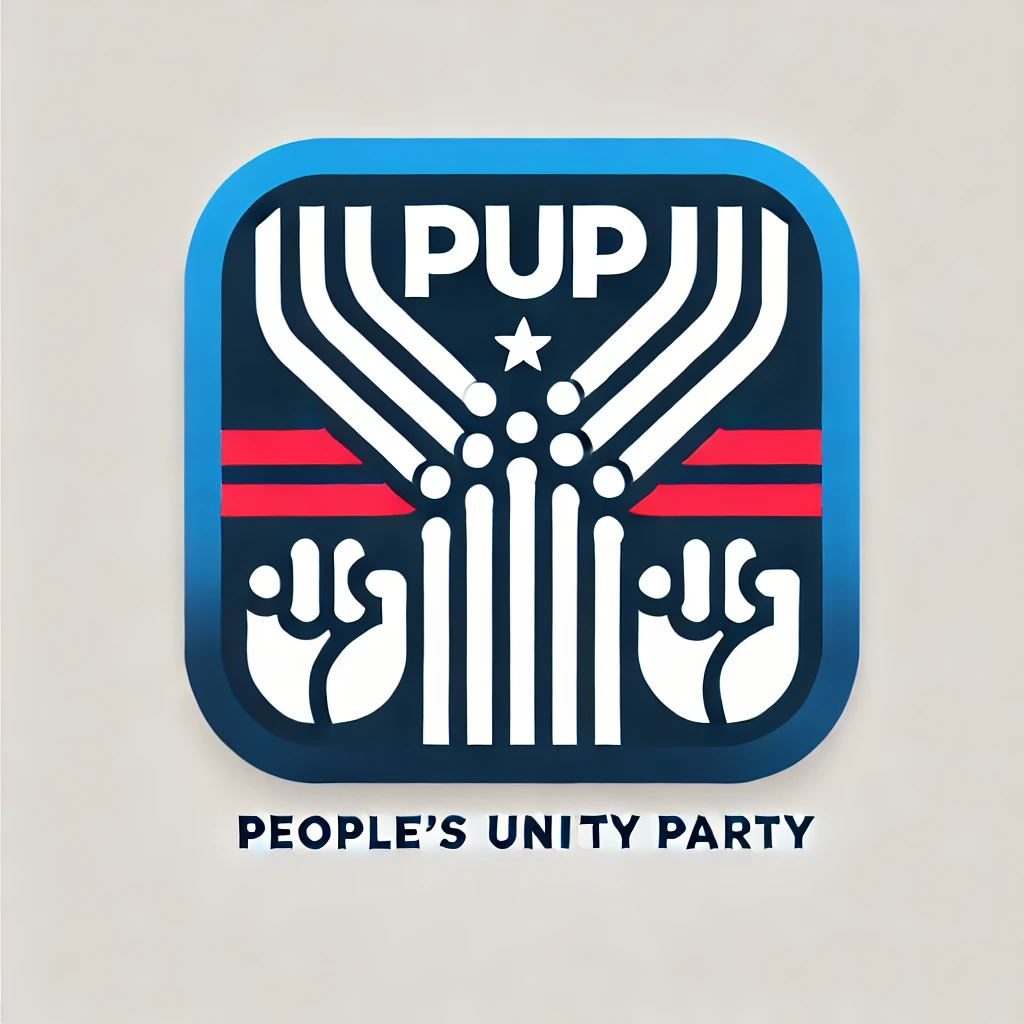


The People’s Unity Party (PUP)
The People’s Unity Party (PUP) is an independent movement focused on empowering hard-working middle-class Americans who have been overlooked by both major political parties. While starting as a wing of the Democratic Party due to its pro-worker stance, PUP remains independent in its mission to create policies that support unions, affordable education, fair wages, and transparency in government.
Powered by

Ensuring Universal Basic Healthcare Coverage with Supplemental Private Insurance Options
Section 1: Short Title
This Act may be cited as the “Comprehensive Care and Choice Act of 2024.”
Section 2: Purpose
To establish a healthcare system that guarantees basic healthcare coverage for every American and legal resident, reduces healthcare costs through Medicare drug price negotiations, and allows for supplemental private insurance options for non-essential services.
Section 3: Definitions
1. Basic Healthcare Coverage:
• Includes preventive care, primary care, emergency services, mental health services, maternal and infant care, chronic disease management, prescription drug coverage, and essential hospitalization services.
• Does not include non-essential services, such as elective cosmetic procedures, luxury hospital accommodations, or alternative treatments not approved by the Department of Health and Human Services (HHS).
2. Supplemental Private Insurance:
• Refers to private health insurance plans offering coverage beyond basic healthcare, including cosmetic procedures, alternative medicine, and other non-essential services.
3. Eligible Individual:
• Any U.S. citizen or legal resident enrolled in the Universal Basic Healthcare Program (UBHP).
4. Medicare Drug Price Negotiation:
• Grants Medicare the authority to negotiate prices for prescription drugs to lower costs for beneficiaries and the federal government.
Section 4: Universal Basic Healthcare Program (UBHP)
1. Establishment:
• The Universal Basic Healthcare Program (UBHP) is created to provide every American and legal resident access to comprehensive basic healthcare coverage at no cost to the individual at the point of service.
2. Administration:
• The UBHP shall be administered by the Department of Health and Human Services (HHS) in coordination with Medicare and Medicaid.
3. Funding:
• Funding shall be provided through a combination of existing healthcare budgets, savings generated from Medicare drug price negotiations, and a modest progressive surtax on individuals earning more than $1 million annually.
4. Enrollment:
• Automatic enrollment upon birth or legal residency.
• No premiums, copays, or deductibles for covered services.
Section 5: Medicare Drug Price Negotiation
1. Authority to Negotiate:
• The Centers for Medicare & Medicaid Services (CMS) shall have the authority to negotiate directly with pharmaceutical manufacturers to determine fair prices for prescription drugs covered under Medicare and UBHP.
2. Target Savings:
• Negotiations shall aim to reduce prescription drug prices by at least 25% compared to current levels, generating an estimated $6 billion in annual savings.
3. Transparency Requirements:
• Drug manufacturers must disclose production costs, research expenditures, and profit margins as part of the negotiation process.
Section 6: Supplemental Private Insurance Options
1. Authorization of Private Insurance Plans:
• Private insurance companies are authorized to offer supplemental plans covering non-essential healthcare services not included in UBHP.
2. Consumer Protections:
• Private insurers must clearly distinguish supplemental plans from basic healthcare to prevent confusion among consumers.
• Prohibit insurers from denying supplemental coverage based on pre-existing conditions.
3. Market Regulation:
• Supplemental insurance plans are subject to oversight by state insurance commissioners to ensure fairness and affordability.
Section 7: Cost-Containment Measures
1. Administrative Efficiency:
• Streamline healthcare administration by consolidating billing systems and eliminating redundancies between Medicare, Medicaid, and private insurers.
2. Fraud Prevention:
• Increase funding for healthcare fraud detection programs to reduce waste and abuse.
3. Value-Based Care:
• Incentivize providers to prioritize quality outcomes over the volume of services delivered through value-based payment models.
Section 8: Reporting and Evaluation
1. Annual Report:
• The Secretary of HHS shall submit an annual report to Congress on the implementation, cost savings, and outcomes of the UBHP.
2. Healthcare Outcomes Evaluation:
• Track metrics such as infant mortality rates, life expectancy, and patient satisfaction to measure the program’s effectiveness.
3. Public Transparency:
• Publish reports on the program’s impact, including cost savings from drug price negotiations, on a publicly accessible platform.
Section 9: Funding Sources
1. Progressive Surtax on High-Income Earners:
• A 2% surtax on individuals earning over $1 million annually.
2. Medicare Savings:
• Reallocate savings from drug price negotiations to fund UBHP.
3. Corporate Accountability:
• Implement a modest tax on pharmaceutical companies with excessive profit margins, incentivizing fair pricing.
Section 10: Effective Date
This Act shall take effect on January 1, 2026, with full implementation by January 1, 2028.
Section 11: Severability
If any provision of this Act is found to be unconstitutional or invalid, the remaining provisions shall remain in effect.
Conclusion
The Comprehensive Care and Choice Act ensures that all Americans receive guaranteed basic healthcare while preserving consumer choice through private supplemental insurance. By allowing Medicare to negotiate drug prices, it achieves significant cost savings, improves public health outcomes, and provides a sustainable path to universal coverage.
Related Blogs
View All





